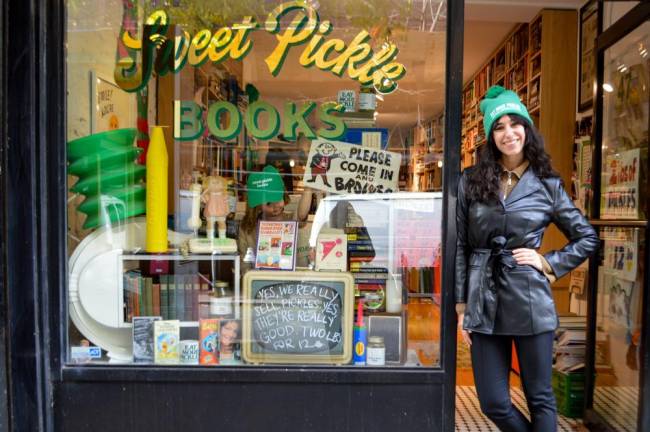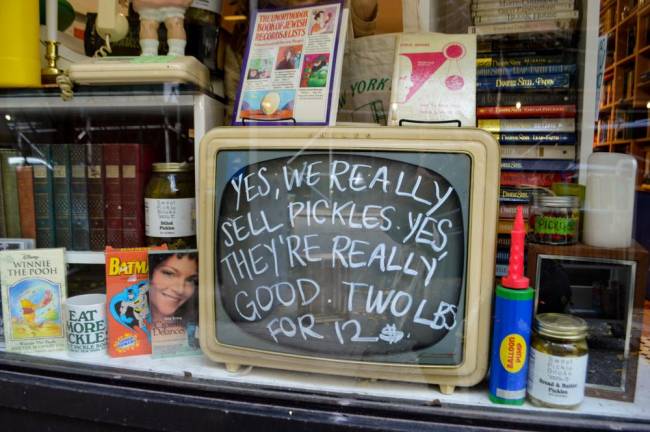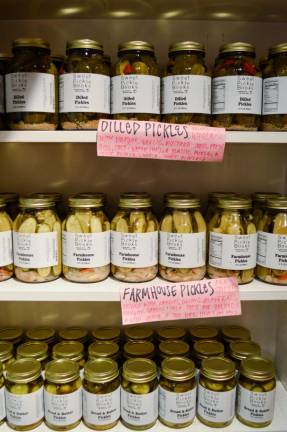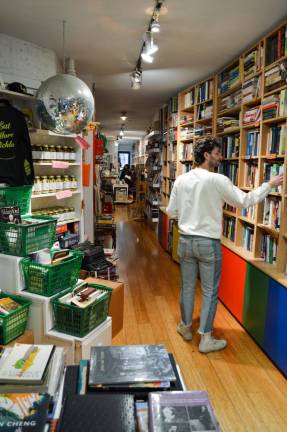On The Lower East Side, You Can Trade Books For Pickles
Two years in, Sweet Pickle Books is still kicking. Leigh Altshuler’s world is fueled by big book deliveries, loyal customers — and pickles.
When Leigh Altshuler and I first spoke on the phone, it sounded like chaos had erupted over at Sweet Pickle Books, her Lower East Side book-shop-slash-pickle-store. She’d received 18 boxes of books, VHS tapes, DVDs and CDs — a haul on the heftier side — from a couple of librarians, who she said live uptown.
“I was like, ‘aahhh,’” she told me in person a few days later, perched on a red stool tucked away at the back of her narrow shop. That same weekend, another generous New Yorker stopped by to drop off a whopping 26 boxes. During pickups at people’s homes, she’s collected bounties of 1,000-something books at a time. “Had I not lost my job due to the pandemic, I never would have done this,” she said. Altshuler, once a Strand Book Store employee and a Lower East Side local since 2019, now deals in trades: literature for bulbous glass jars, filled with variations of the treat after which the store is named.
Business has been booming, two years after Sweet Pickle Books opened during the COVID-19 pandemic. And as the shop has undergone design iterations, Altshuler’s confidence has blossomed. On a quiet Monday afternoon in the beginning of December, we chatted books, building a business and, of course, pickles. Our conversation has been edited for length and clarity.
How frequently are you picking up books or receiving deliveries, nowadays?
Every day. Every single day. And I have a backlog of emails from people who are like, “I have books for you,” and I say, “I can’t get them for another month.” They say, “I don’t care, I want to give them to you.”
It’s fun, because you get to see all these people’s places and how they live and how they use their books. It’s really lovely.
How does that compare to the early days of Sweet Pickle Books?
When I first opened, a lot of people wanted to donate their books. Once they found out, once they got word — even before I opened — I would get emails that said, “Hey, I got your email from so-and-so.” It’s like a lot of, seriously, old Jewish people. There’s a network of them.
Once I opened for real, people would come in and I was still buying books at the time. I would either give them cash or store credit. But a lot of people said, “I can’t believe a bookstore just opened in the middle of the pandemic, I just want to donate these.” I said, “Please take something, just take a jar of pickles.” Once that became the real trade or the real currency here, then it just kind of spiraled.
And most people want pickles?
Everybody wants pickles. We don’t even buy [books] anymore, because people want pickles. When they see the jar, how big it is, they’re like, “Wait, really? I get all of this?”
They’re our pickles, our recipe. When I opened, I had 360 jars of pickles and I thought for sure that would last me the whole entire time that my store was open. And they went like that. Now, the farm that grows the produce batches everything for us with our recipe and jars them. It’s a whole other business. We go through pickles faster and faster and faster.
What else has changed in the shop? How have you reinvented the space?
Oh my god, it’s so different. I had to get rid of two couches and I actually sold them to customers. People would always come in and say, “Is this couch for sale?” One was this really lovely brown leather couch from EQ3. The other one was a midcentury modern, also brown, wooden arm sofa, secondhand from the 60s. I actually had bought that for an apartment and it didn’t fit. I think about it all the time, but I don’t know what I was thinking, having two couches in this little store.
My mom used to move the furniture around in my house when I was younger all the time. And my brother and I would laugh and say when we got home from school, our house would be completely different. And I would find my mom by herself, pushing a couch. We would be hysterical. But now I do it in here, so I get it.
How has your mentality as a small business owner evolved?
When I first opened, I didn’t have employees, so that’s the number one thing. It’s better with people; you get so much more done. Three heads are better than one.
I feel like a lot of people didn’t take me seriously at first — definitely a lot of men. Sometimes they still don’t. Now, I have my feet way more firmly planted in the ground, where I’m like, This is a good idea and this is a good business. I’m definitely more confident in the decisions I make as a business owner, I go with my gut 100 times over. So I feel like I’m also allowing myself to have a stronger voice in here than when I first opened. And that feels really good.
Are small businesses thriving as the pandemic eases up?
Especially down in the Lower East Side, small businesses are cool and they’re back. People are wanting to shop local and support the stores in their neighborhood. And they don’t want to be using these big box stores or even Amazon. I have some customers that are like, “Oh, I figured I’d check here before.”
I feel like [small businesses] are stronger, better than ever. And it kind of reset the city in a way that’s made it fair for the little guys again.
What insight have you gleaned from your customers?
From a book-buying standpoint, people are always looking to learn more about New York. People really like learning about the history of the Lower East Side, even when I tell them about the pickling history and how that started and why we have pickles here. [Essex Street reportedly was once dubbed “Pickle Alley,” thanks to a thriving pickle peddling scene, and legal drama ensued after the death of Guss’ Pickles’ founder.]
The number one thing that I try to do here is make everything feel accessible. It’s not really like snobby, pinky-up, capital L literature. You can read whatever you want here, I’m here for it. That has opened up a lot of conversations for people to be like, “Hey, I’m looking for Twilight. Do you have it?” Like yeah, obviously.
What are you reading right now?
I’m reading, like, 20 books right now. I’m in one of those phases. I’m reading “Heavy” by Kiese Laymon, which I’m really excited about. It came in last night and I’ve been wanting to read it. I’m re-reading “Carrie” by Stephen King. I just finished reading “Acting Class” by Nick Drnaso; it’s a graphic novel and it’s new, I bought it new. And I’m reading another new thing, I’m reading the best American essay collection edited by Alexander Chee [“The Best American Essays 2022”].
Do you pull most of your own reads from the shop?
I do sometimes, but often on my off days, I will go to other bookstores. Because I’m like, “Wow, what would I want to do on my day off?”
You’ve also been helping your boyfriend, Costa Damaskos, and his business partner, Jake Marsiglia, at their new restaurant in East Williamsburg, Brooklyn. What’s that like?
They opened a modern diner called Baby Blues Luncheonette. [Damaskos] also has a design agency. Seeing him run the agency was a big thing for me. I don’t think I would have opened this store if I didn’t see him — he made it seem so much less scary.
Seeing a physical space where people can go and come to and gather — this was always an idea for him, Baby Blues, and then I think he pulled the trigger once he saw me doing this. So it was nice to go back and forth.
They do serve the Sweet Pickle Books pickles there.
I was about to ask!
I got to see people eating the pickles and saying the pickles were good — and it’s on the menu. Some of my customers now go there to eat. I have one regular customer here and we joke around because we both see him every day.
“Had I not lost my job due to the pandemic, I never would have done this.” Leigh Altshuler, owner of Sweet Pickle Books



